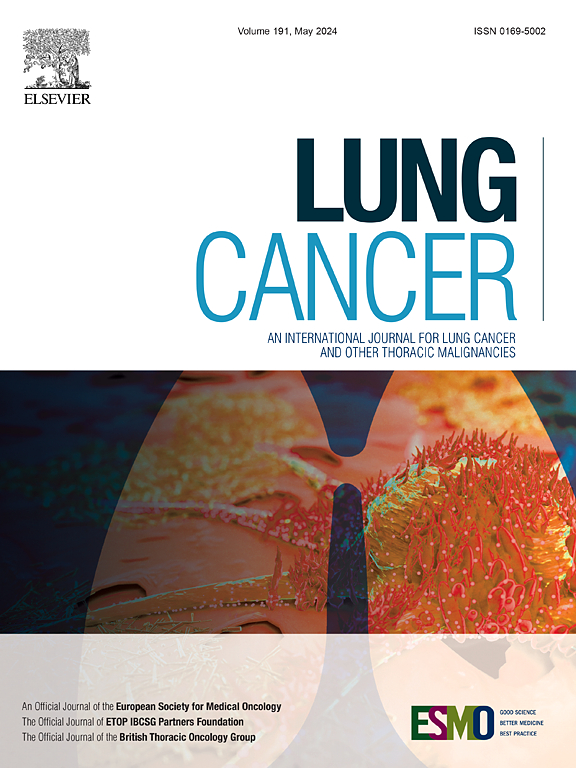Dacomitinib in the treatment of EGFR-mutated non-small cell lung cancer with brain metastases: an open-label, multicenter, phase II study
IF 4.4
2区 医学
Q1 ONCOLOGY
引用次数: 0
Abstract
Objectives
Dacomitinib’s efficacy in patients with severe brain metastases remains understudied. This study aimed to evaluate dacomitinib in treatment-naïve non-small-cell lung cancer (NSCLC) patients with EGFR mutations and multiple brain metastases.
Methods
This open-label, multicenter, Phase II study enrolled 15 treatment-naïve NSCLC patients with ≥3 brain metastases, including at least one lesion >1 cm. Patients received dacomitinib 45 mg/day orally. Primary endpoints included progression-free survival (PFS), while secondary endpoints encompassed objective response rate (ORR), disease control rate (DCR), intracranial ORR (iORR), intracranial PFS (iPFS), and the incidence of treatment-emergent adverse events (TEAEs). Exploratory analyses were conducted to evaluate the influence of different types of EGFR mutations on the clinical outcomes. This study was registered in ClinicalTrials.gov (NCT04339829) and is closed to accrual.
Results
The median PFS was 16.8 months (95 % CI: 15.376, NE), with an overall ORR of 93.3 % (95 % CI: 68.052 %, 99.831 %) and DCR of 100 %. Intracranial efficacy was notable, with an iORR of 66.7 % (95 % CI: 38.380 %, 88.176 %) and median iPFS of 16.6 months (95 % CI: 3.614, NE). Among patients evaluated for intracranial response, the iORR reached as high as 90.9 %. Exploratory analyses revealed no significant differences in PFS, iPFS, or disease progression based on exon 19 deletions or L858R mutations. Six patients (40 %) experienced ≥grade 3 TEAEs which were manageable.
Conclusion
Dacomitinib demonstrated robust systemic and intracranial efficacy in patients with NSCLC harboring EGFR mutations and severe brain metastases, with acceptable adverse events, thereby supporting its use as a first-line treatment.
达科米替尼治疗egfr突变的非小细胞肺癌伴脑转移:一项开放标签、多中心、II期研究
目的:达科替尼治疗严重脑转移瘤的疗效尚待进一步研究。本研究旨在评估dacomitinib在treatment-naïve非小细胞肺癌(NSCLC)患者中EGFR突变和多发性脑转移的疗效。方法:这项开放标签、多中心、II期研究纳入了15例≥3个脑转移的treatment-naïve非小细胞肺癌患者,包括至少一个1厘米的病变。患者口服达科替尼45毫克/天。主要终点包括无进展生存期(PFS),次要终点包括客观缓解率(ORR)、疾病控制率(DCR)、颅内ORR (iORR)、颅内PFS (iPFS)和治疗中出现的不良事件发生率(teae)。通过探索性分析来评估不同类型EGFR突变对临床结果的影响。该研究已在ClinicalTrials.gov注册(NCT04339829),并已结束累积。结果中位PFS为16.8个月(95% CI: 15.376, NE),总ORR为93.3% (95% CI: 68.052%, 99.831%), DCR为100%。颅内疗效显著,iORR为66.7% (95% CI: 38.3380 %, 88.176%),中位iPFS为16.6个月(95% CI: 3.614, NE)。在评估颅内反应的患者中,iORR高达90.9%。探索性分析显示,基于外显子19缺失或L858R突变的PFS、iPFS或疾病进展无显著差异。6例患者(40%)经历≥3级teae,可控制。结论dacomitinib对EGFR突变和严重脑转移的NSCLC患者表现出强大的全身和颅内疗效,不良事件可接受,因此支持其作为一线治疗。
本文章由计算机程序翻译,如有差异,请以英文原文为准。
求助全文
约1分钟内获得全文
求助全文
来源期刊

Lung Cancer
医学-呼吸系统
CiteScore
9.40
自引率
3.80%
发文量
407
审稿时长
25 days
期刊介绍:
Lung Cancer is an international publication covering the clinical, translational and basic science of malignancies of the lung and chest region.Original research articles, early reports, review articles, editorials and correspondence covering the prevention, epidemiology and etiology, basic biology, pathology, clinical assessment, surgery, chemotherapy, radiotherapy, combined treatment modalities, other treatment modalities and outcomes of lung cancer are welcome.
 求助内容:
求助内容: 应助结果提醒方式:
应助结果提醒方式:


